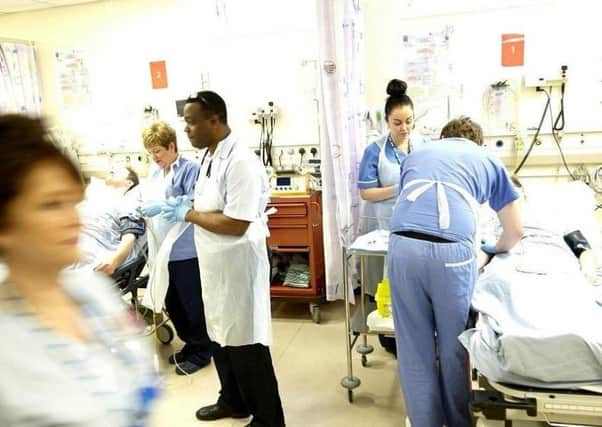Jayne Dowle: Too frightened to call for help from troubled NHS


According to the latest figures from Public Health England, three times as many people are dying of flu this winter in the UK compared with last year.
The week before my own illness struck, 35 people lost their lives to flu – more than three times the 11 deaths recorded in the corresponding seven days last January. The death toll from flu since October is about treble the 53 fatalities that occurred in the same period last year.
Advertisement
Hide AdAdvertisement
Hide AdAt least I think that’s what the pounding headache, rocketing temperature, nausea, hacking cough, palpitations, muscle pains and general sense of disorientation amounted to. With the help of Doctor Google, I’ve had to make my own diagnosis.
In normal circumstances – and I’m begging the question of what is “normal” with the NHS these days – by day two or three of all these symptoms at once, I’d at least be trying to see my GP, just to check that nothing more sinister was brewing.
In my paracetamol-fuelled haze, the word “pneumonia” kept hoving into view. This inflammatory condition of the lungs is usually the biggest cause of death from contracting the influenza virus. It killed hundreds of millions of people in the twentieth century, causing more deaths than both world wars put together. And frighteningly, it is still rife.
All the markers of pneumonia – cough, chest pain, trouble breathing and high fever – were there. It comes to something when you’re so scared of troubling the completely overwhelmed NHS that you dared not phone a doctor or go to A&E even when you feel more ill than you have ever felt in your life.
Advertisement
Hide AdAdvertisement
Hide AdWe’ve all seen the footage of overcrowded hospital waiting rooms and ambulances queuing up. We’ve all been warned that visiting the doctor’s surgery and spreading your germs is the least-sensible thing you can do. And yes, we understand that flu is a virus and it can’t be cleared up by a dose of antibiotics. The public health campaign has been clear – but has it cost some of those lives lost?
All I can say for sure is that it is no solace whatsoever at 3am when you’re delirious with fever and would do anything just to make the weight pressing down on your chest go away. Following the rules, how many people are suffering in silence at home because they don’t want to trouble their doctor? How many people are leaving it too late to seek help if their condition worsens?
Public Health England reports that there has now been a big jump in the number of people hospitalised with the virus. I can only wonder if this is because seriously ill people have, in some instances, tried to solider on valiantly for too long on their own.
I could take some comfort from the fact that I was not alone. My partner, remarkably patient with all this despite the fact that he gets up for work at 5.30am, was there to fetch me water and lay a cold flannel on my head in the middle of the night.
Advertisement
Hide AdAdvertisement
Hide AdMy parents, not in the best of health themselves, came round with food parcels whilst I stayed in curfew in the bedroom. Even my children were moved to offer their support; Lizzie pitched in with tidying and shopping and Jack bought me a bottle of Lucozade out of his own money (I’m not sure I’ll ever be allowed to forget this particular act of kindness).
If my condition had suddenly deteriorated, at least someone could have called for emergency medical assistance. Imagine for a moment if I had been a person living on my own. Too proud to ask for help, too exhausted to get out of bed to fetch a drink or medication, it’s but a short step to dehydration and then collapse.
Like any virus, flu affects the elderly, the very young and those with weakened immune systems the worst. It is however, no respecter of age. In the late 1990s, when I worked at a newspaper office in London, we had a jolly car-park attendant who always greeted everyone with a smile. One day he wasn’t there. Or the next. My friend and I asked his colleague where he was. “He died of flu,” the man said. “Went home from work and died the next day.”
I’ve had plenty of time to think these last seven days. Lying there in my restless bed, I’ve gone over just about every mistake I’ve made in my life and vowed to emerge from my pit of despair with a fresh and positive perspective on life.
Advertisement
Hide AdAdvertisement
Hide AdHowever, the biggest thing I’ve learned is that even if you have a decent family around you, England is a lonely and dangerous place to be ill these days. As the NHS prepares to commemorate its 70th anniversary this summer, its founders must be turning in their graves.